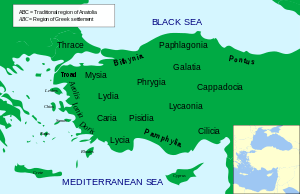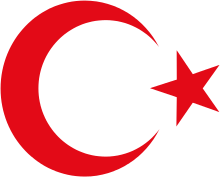List of ancient peoples of Anatolia

This is a list of ancient peoples of Anatolia in the prehistoric period.
Non-Indo-Europeans
Hattians
The Hattians were an ancient people who inhabited the land of Hatti (present-day central Anatolia, Turkey). The group was documented at least as early as the empire of Sargon of Akkad (c. 2300 BC),[1] until it was gradually absorbed c.2000–1700 BC by the Indo-European Hittites, who became identified with the "land of Hatti".
Indo-Europeans
Anatolians
- Carians
- Hittites
- Hurrians
- Isaurians
- Luwians
- Lycians
- Lydians
- Mariandyni
- Mysians
- Lycaonians
- Palaics
- Pamphylians
- Pisidians
- Sidians
Armenians
Armenians were living in a land around the highlands surrounding the Biblical mountains of Ararat. In the Bronze Age, several states flourished in the area of Greater Armenia, including the Hittite Empire (at the height of its power), Mitanni (South-Western historical Armenia), and Hayasa-Azzi (1600–1200 BC). Soon after the Hayasa-Azzi were the Nairi (1400–1000 BC) and the Kingdom of Urartu (1000–600 BC), who successively established their sovereignty over the Armenian Highland. Each of the aforementioned nations and tribes participated in the ethnogenesis of the Armenian people.[2]
Bithynians
Greeks
The Mycenaeans Greeks by the 15th century BC had reached Rhodes, Crete, Cyprus, where Teucer is said to have founded the first colony, and the shores of Asia Minor.[3][4] Moreover, Greeks were settled in Ionia and Pontus. Miletus in Ionia was an ancient Greek city on the western coast of Anatolia, near the mouth of the Maeander River. The Late Bronze Age, 13th century BC, saw the arrival in the area of Luwian language speakers from south central Anatolia calling themselves the Carians. Later in that century other Greeks arrived. The city at that time rebelled against the Hittites. After the fall of that empire the city was destroyed in the 12th century BC and starting about 1000 BC was resettled extensively by the Ionian Greeks. Before the invasion from Persia in the middle of the 6th century BC, Miletus was considered the greatest and wealthiest of Greek Polis.[5][6] Over several centuries, numerous Ancient Greek city-states were established on the coasts of Anatolia. Greeks started Western philosophy on the western coast of Anatolia (Pre-Socratic philosophy).[7] Thales, Anaximander, Anaximenes, Diogenes of Apollonia were among of the renowned Milesian school philosophers. Heraclitus lived in Ephesus (/ˈɛfəsəs/;[1] Greek: Ἔφεσος Ephesos; Turkish: Efes) another ancient Greek city[8][9] and Anaxagoras was from Clazomenae, a city on the coast of Ionia and a member of the Ionian League. All Ancient Greek dialects were spoken in Anatolia depending on the origin of the City states and the list of ancient Greek theatres in Anatolia is one of the longest among all places Greeks had settled. In Pontus, Greeks traditionally lived in the region of Pontus, on the shores of today's Turkey's Black Sea and in the Pontic Alps, in northeastern Anatolia and the former Armenian province of Kars in Caucasus, and also in Georgia. Those from southern Russia, the Ukraine, and Crimea are often referred to as 'Northern Pontic Greeks', in contrast to those from 'South Pontus', which strictly speaking is Pontus proper. Those from Georgia, northeastern Anatolia, and the ones who lived in present-day Armenia are often referred to as 'Eastern Pontic Greeks' or Caucasus Greeks. The Greeks have founded well known cities to this day. The cities of Sinope (Greek: Σινώπη, Sinōpē) and Trabzon (Greek: Τραπεζοῦς Trapezous), were founded by Milesian traders (756 BC) as well as Samsun, Rize and Amasya. Greek was the lingua franca of Anatolia from the conquests of Alexander the Great up to the invasion of the Seljuk Turks in the eleventh century AD.
Phrygians
While some consider the Phrygians part of a wider "Thraco-Phrygian" group, other linguists dismiss this hypothesis since Thracian (and hence Daco-Thracian) seem to belong to the Satem group of Indo-European languages, while Phrygian shared several similarities with other Indo-European languages of the Centum group (Latin, the Anatolian languages). Of all the Indo-European languages, Phrygian seems to have been most closely linked to Greek, suggesting that the two languages belonged to the same dialectal subgroup of early Indo-European.[10] Phrygia developed an advanced Bronze Age culture. The earliest traditions of Greek music derived from Phrygia, transmitted through the Greek colonies in Anatolia, and included the Phrygian mode, which was considered to be the warlike mode in ancient Greek music. Phrygian Midas, the king of the "golden touch", was tutored in music by Orpheus himself, according to the myth. Another musical invention that came from Phrygia was the aulos, a reed instrument with two pipes. Marsyas, the satyr who first formed the instrument using the hollowed antler of a stag, was a Phrygian follower of Cybele. Under Persian rule, the Phrygians seem to have lost their intellectual acuity and independence. Phrygians became stereotyped among later Greeks and the Romans as passive and dull. Phrygians remained subjects to the Hellenistic kingdoms that ruled the area and later to the Roman Empire, but the Phrygians retained their culture and their Phrygian language until it became extinct in the 5th Century.
See also
References
- ↑ Trevor Bryce, The Kingdom of the Hittites: New Edition, Oxford University Press, 2005. p.12
- ↑ Vahan Kurkjian, "History of Armenia", Michigan, 1968, Armenian Soviet Encyclopedia, v. 12, Yerevan 1987; Artak Movsisyan, "Sacred Highland: Armenia in the spiritual conception of the Near East", Yerevan, 2000
- ↑ "The Greeks". Encyclopædia Britannica. US: Encyclopædia Britannica Inc. 2008. Online Edition.
- ↑ Criti, Maria; Arapopoulou, Maria (2007). A History of Ancient Greek: From the Beginnings to Late Antiquity. Cambridge: Cambridge University Press. pp. 417–420. ISBN 0-521-83307-8.
- ↑ A Short History of Greek Philosophy By John Marshall page 11 “For several centuries prior to the great Persian inversion of Greece, perhaps the very greatest and wealthiest city of the Greek world was Miletus”
- ↑ Ancient Greek civilization By David Sansone page 79 “In the seventh and sixth centuries BC the city of Miletus was among the most prosperous and powerful of Greek Poleis.”
- ↑ Carl Roebuck, The World of Ancient Times, 1984.
- ↑ Michael Gagarin (2010). The Oxford Encyclopedia of Ancient Greece and Rome. Oxford University Press. pp. 2–. ISBN 978-0-19-517072-6. "Historical Overview A Greek city-state on the Aegean coast of Asia Minor, at the mouth of Cayster River (Küçük Menderes), Ephesus ..."
- ↑ Carlos Ramirez-Faria (1 January 2007). Concise Encyclopeida Of World History. Atlantic Publishers & Dist. ISBN 978-81-269-0775-5.
- ↑ Claude Brixhe, Phrygian, in Roger D. Woodard (editor), The ancient Languages of Asia Minor, Cambridge University Press, 2008, p. 72
Further reading
- Steadman, Sharon R.; McMahon, Gregory (2011). The Oxford Handbook of Ancient Anatolia: (10,000-323 BCE). Oxford University Press. ISBN 0195376145.
